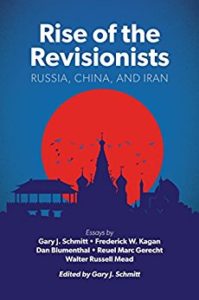 The American Enterprise Institute (AEI) explores the ascension of Russia, China, and Iran in its latest book, Rise of the Revisionists, a collection of essays that focuses on the ambitions of each country and how the United States might address their influence. Editor Gary J. Schmitt, a resident scholar at AEI, insists understanding their roots and the inherent challenges they pose on an international scale is crucial to the United States’ own security and national interest.
The American Enterprise Institute (AEI) explores the ascension of Russia, China, and Iran in its latest book, Rise of the Revisionists, a collection of essays that focuses on the ambitions of each country and how the United States might address their influence. Editor Gary J. Schmitt, a resident scholar at AEI, insists understanding their roots and the inherent challenges they pose on an international scale is crucial to the United States’ own security and national interest.
“One of the things I think we tried to do is we didn’t want to necessarily lump the three together,” Schmitt told Homeland411. “Obviously there’s two basically common themes—one is [that] each of these states obviously is ambitious, and the second one is that … they present themselves as challenges to the liberal political West.” The essays highlight the fact that each nation has certain strengths and weaknesses on which the United States would want to focus when conceptualizing an international strategy.
In the book, AEI resident scholar Frederick W. Kagan tackles Russia in “Russia: The Kremlin’s Many Revisions”; AEI resident fellow Dan Blumenthal focuses on “China: The Imperial Legacy”; and Reuel Marc Gerecht, a senior fellow at the Foundation for the Defense of Democracies, addresses “Iran: The Shi’ite Imperial Power.” Hudson Institute scholar Walter Russell Meade closes with an essay on the inherent challenges of dealing with such foes in “Not a Trap but a Minefield: The Thucydidean Challenge to American Foreign Policy.”
 In presenting these countries as “revisionist” Schmitt warned that there is the tendency to contrast the United States as “status-quo power,” which he said is not the truth, as the United States continues evolving. Certain constants exist, however, when it comes to the United States and its influence.
In presenting these countries as “revisionist” Schmitt warned that there is the tendency to contrast the United States as “status-quo power,” which he said is not the truth, as the United States continues evolving. Certain constants exist, however, when it comes to the United States and its influence.
“We, in my view, correctly think that having more liberal democratic allies makes the world safer for both us and for our allies, and so it’s inevitable that we’re pushing that agenda, and as a result buts up against their own sense of legitimacy,” Schmitt said. “If their neighbors are liberal, democratic, and prosperous, and they’re not, and they’re not doing as well, then there’s it’s an inevitable butting of heads.”
In his introduction to the book, Schmitt notes that whenever the United States attempts to “satiate” these three powers, it simply doesn’t work.
“China, Iran, and Russia have each been willing participants in the global trading system,” Schmitt wrote. “But expectations that such participation might help generate internal reform or at least moderate behavior internationally have gone unmet.”
Schmitt also addresses two problems facing the United States in these three world theaters. The first is the fact that these powers exist, and though historically advantageous, the separation from Europe and Asia by two oceans is a challenge when its necessary to deter one of these powers. The second problem is the cost of that deterrence.
“When the public has fresh memories of failing to stop an ambitious power and the country has had to pay for that failure with a costly conflict, it is easier to convince that same public and its representatives that forward-leaning deterrence is the right course,” Schmitt wrote. “But successful deterrence can also breed complacency—the feeling that the peace and prosperity brought about by that strategy is the natural order of things, not a result of policy decisions made and sustained.”
He suggests that the country recognize the value of American leadership and that leaders tout the benefits of such liberal leadership that emerged after World War II.
“Like an understanding and appreciation of American government itself, this is something that every generation of Americans must (re)learn,” he wrote. “Left untaught, it—and the historical memory of its import—will fade.”
Order the book here.
©2018 Homeland411
Be sure to subscribe to our weekly newsletter.